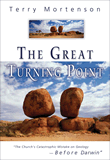
Christian Reluctance to Jump on Global Warming Bandwagon Attributed to Skepticism of Evolution
Christianity Today publishes misguided article by Andy Crouch on global warming.
[Editor's note: AiG does not typically get involved in the debate concerning controversial environmental issues. This guest commentary, however, offers an opinion on an article printed in an influential Christian magazine that made a connection between the question of origins and global warming, and thus it merits some examination. For more information on AiG's views on environmentalism, please visit our Get Answers: Environmentalism page.]
Christianity Today not only has a lot of influence in the Christian world, but also it is likely a measure of where the average evangelical pastor and evangelical university professor is-and the picture is not rosy. Not only does this USA magazine side with those who believe we must act now to stop global warming, but they also blame evangelical reluctance to jump on the act-now bandwagon on skepticism of evolution.
Misguided on global warming
In the August 2005 issue Andy Crouch wrote an article chiding evangelicals for mistrusting scientists on the issue of greenhouse warming.1 He represents those evangelical leaders, including the editors of Christianity Today, who strongly believe that humans are warming the planet so fast that we need to act immediately to avoid catastrophic warming:
The theory is the all-but-unanimous consensus that human beings are changing the climate by emitting gigatons of carbon into the atmosphere, and that if we do nothing to change our behavior, the warming trend that has taken hold for the past century may well become a runaway gallop.2
There is still a significant minority of atmospheric scientists and climatologists who are skeptical of the significance of man-induced greenhouse warming.3 However, these scientists are not in positions of power and are treated almost as badly by the mainstream establishment as believers in young-earth creationism (or intelligent design). Crouch is correct that the issue is not that man is causing global warming, since skeptics also believe in man-caused global warming. However, he fails to inform his readers that the issue is over how much warming and whether it will have a net harmful effect.
He compares acting immediately to reduce carbon dioxide emissions to Pascal's wager in which Pascal stated that if God does not exist, the believer loses nothing, but if God exists, the unbeliever loses everything. He claims that we would lose little by acting now, but if we are wrong the consequences may be catastrophic.
Crouch grossly underestimates the impact of fighting greenhouse warming. The cost would likely be trillions of dollars to economies of the western nations, and the rich countries would need to aid the poor countries, adding much more to the cost.
The uniformitarian bias
Most of the reason for the hype to act now is because scientists now lean toward the idea that the climate can change abruptly 10 to 25°F in a matter of decades. That is why Crouch is afraid of a "runaway gallop" in climatic warming. This paradigm change in climatology is because of abrupt changes in oxygen isotopes (generally correlated with temperature) and other variables discovered in ice cores on the Greenland Ice Sheet.4 But their belief in abrupt climate change is a consequence of their "uniformitarian" worldview that ignores the Bible and the post-Flood rapid Ice Age.5,6,7
So why are there prominent skeptics of the significance of greenhouse warming? The main reason is observations. We have observed a 30% increase in carbon dioxide in about 120 years and another 30% increase in carbon dioxide equivalents from other greenhouse gases. This 60% rise in carbon dioxide and its equivalents has caused a slight global warming of only 1°F.
Probably around half of this warming, however, can be attributed to natural processes that cause warming, such as less volcanic ash in the stratosphere and possibly a little more solar radiation. We could easily be in the warm cycle of a natural variation. Between 1350 and about 1880, the world was in a cool cycle called the Little Ice Age in which all the glaciers of the world advanced, whereas now practically all glaciers are receding.
So, it seem that the 60% increase in carbon dioxide and equivalents has resulted in only about a 0.5°F warming of the climate. Obviously the many climate models that have been run with a doubling of carbon dioxide, leaving all other variables the same and predicting a 3 to 10°F warming, are much too sensitive to carbon dioxide. It is possible that there is a retarding influence in the atmosphere, slowing the temperature rise. Advocates warn that this retarding influence may soon wane, catastrophically accelerating global warming. This catastrophic scenario is not likely. My position is that we need more balanced research, and that is actively doing something.8
But Crouch seems to believe the greenhouse scare rhetoric without question. He says that science is too complex and that we must trust the scientists. This is not a scholarly approach and is unbecoming of a magazine of the caliber of Christianity Today. All a layman or scientist need do is examine both sides of the issue. There is plenty of easily readable material available.
Blame antievolutionists
The worse part of Crouch's article is that he blames our mistrust of "science," as well as "countless unspecified consequences," on our opposition to evolution:
The resulting battle between evolutionism and Christian faith has had countless unfortunate consequences. Some Christians resort to a wooden interpretation of the first pages of Genesis that was no better as science than evolution was as a worldview …
But perhaps no result of the creation-evolution stalemate is as potentially disastrous as the way it has stymied courageous action on climate change [emphasis mine].9
He fails to understand that good science has a degree of healthy skepticism, and a scientist, as well as a layman, should look at both sides of an issue and not necessarily side with those in cultural power. Scientists and laymen should be seekers of truth. He does admit that we have reason to mistrust science because of its naturalism and scientism, but does not extend this mistrust to evolution. (Actually, we do not mistrust real science but speculative interpretations of the unobservable past.)
He seems easily persuaded to believe the unscientific speculations of sinful men about the past over God's clearly written Word. Those who believe in a straightforward, literal Genesis are labeled as having a "wooden interpretation." If one isn't "wooden" with clear historical statements, then I submit that one can easily not be wooden when it comes to other historical events and statements, such as Jesus' death and resurrection, and that there was no death of man or animals before sin. Jesus was "wooden" about Genesis, and so should all Christians be.
Crouch, as well as the editors of Christianity Today, would be wise if they would apply the wooden words of Paul in 1 Thess. 5:21: Examine everything carefully; hold fast to that which is good
(NASB).
Footnotes
- Crouch, A., Environmental wager: Why evangelicals are-but shouldn't be-cool toward global warming, Christianity Today 49(8):66, 2005.
- Crouch, A., Environmental wager: Why evangelicals are-but shouldn't be-cool toward global warming, Christianity Today 49(8):66, 2005.
- Michaels, P.J. and Balling, Jr., R.C., The Satanic Gases-Clearing the Air about Global Warming, CATO Institute, Washington D.C.
- {5 get_urls "19843" alt="Oard, M.J." %}, The Frozen Record: Examining the Ice Core History of the Greenland and Antarctic Ice Sheets, Institute for Creation Research Technical Monograph, El Cajon, California, p. 128, 2005.
- Oard, The Frozen Record, pp. 1-199.
- Oard, M.J., An Ice Age Caused by the Genesis Flood, Institute for Creation Research, El Cajon, California, 1990.
- Oard, M.J., Frozen in Time: Woolly Mammoths, the Ice Age, and the Bible, Master Books, Green Forest, Arkansas, 2004.
- Oard, M.J., The Weather Book, Master Books, Green Forest, Arkansas, pp. 70-71.
- Crouch, A., Environmental wager: Why evangelicals are-but shouldn't be-cool toward global warming, Christianity Today 49(8):66, 2005.
Recommended Resources

Answers in Genesis is an apologetics ministry, dedicated to helping Christians defend their faith and proclaim the good news of Jesus Christ.
- Customer Service 800.778.3390
- © 2025 Answers in Genesis






